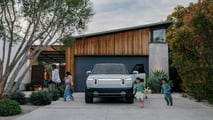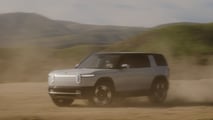
- Rivian CEO RJ Scaringe says dealer franchise laws are "as close as you can get to corruption."
- Many states have laws restricting manufacturers from competing with dealers, but what that means varies by state.
- Some states still won't let Tesla or Rivian sell cars, and those states tend to have powerful dealer lobbies.
Despite its recent partnership with the German auto giant, Rivian has no plans to use Volkswagen's sales network, according to CEO RJ Scaringe. It wouldn't want to. But VW's service network is a far more interesting proposition, as scaling service has proved troublesome for Rivian and fellow direct-to-consumer automaker Tesla. Unfortunately, using VW service centers is probably not going to be possible in the U.S. Scaringe told reporters that dealers have made that almost impossible.
"Unfortunately, in the United States it's not an easy question. We have this horrific state-by-state level of rules that are as close as you can get to corruption," Scaringe told InsideEVs and other reporters during a roundtable.
"I think you essentially have, like, lots of dealers have paid for laws that make it really hard for us to interact directly with the consumer," he continued.
Gallery: 2025 Rivian R1S First Drive






Many states have protections for car dealers codified into law. They broadly protect dealers from having to directly compete with manufacturers, but how those rules are interpreted and applied varies wildly. In Tesla's home state, Texas, the company cannot sell cars out of company stores. Instead, it must sell cars online, and can deliver them at "service centers." Rivian's space in Seattle is similar, as in Washington the company's representatives cannot talk about pricing or take orders.
These laws were—in most cases—designed to protect dealerships from their own manufacturers selling direct-to-consumer, cutting out the middle man and outcompeting them on cost. But they are now stifling brands that don't have dealerships to compete with. There's no AutoNation Rivian or Penkse Tesla losing business when these companies sell in Texas or Washington. There's no option at all if you, as a consumer, want to buy a Tesla and take delivery in Louisiana. So these laws are effectively protecting dealers of other brands from legitimate competition with new brands.
The states with the strongest laws protecting dealers tend to have extremely large and powerful car dealer lobbies, which wine, dine and donate to local politicians to make sure they have plenty of friends in state government. These friendly relationships tend to correlate with laws that make sure it is nearly impossible to buy a car without including a dealer in the transaction. It's not hard to see why Scaringe says this is essentially "corruption." They're spending vast sums lobbying and being rewarded with laws that restrict consumer choice and competition while protecting their profits.
Because the laws are different in every state, you have to grease a lot of wheels to get the train moving. There are still states where it is illegal to sell Rivians or Teslas directly. And there are many states where dealers plan to challenge Volkswagen's plan to launch Scout Motors with a direct-to-consumer model, a la Tesla. If even one challenge in a major market succeeds, it may mess up the whole plan. Because while it's hard enough to sell vehicles directly to consumers, it gets a lot harder if you also have franchises operating as official sales and service locations.
Gallery: Rivian R2







All of the issues Rivian faces with its direct-to-consumer push "become exacerbated if we were to use a mixed model" where they have directly owned and franchise service centers, Scaringe says. So it's likely not possible to use VW dealers for service, even if VW was cool for it. But the CEO is still clear-eyed that expanding service options needs to be a priority, and not just doing service where you sell cars.
"You don't need 5,000 retail locations in the United States to sell three or four million cars a year. Tesla's a good example. [Its] number of retail locations per sale is far, far lower than any of the incumbents. But you do need a lot of service infrastructure," he said.
The vehicle's ability to diagnose and report its own problems will help improve service efficiency, as will Rivian's ability to do most service in your driveway. Over half of the company's current service visits are handled by its mobile service arm. But the fact is that the service infrastructure needs to grow, regardless of how difficult it is to navigate the U.S.' state-by-state restrictions.
"We have a service backlog where we're trying to build as much service infrastructure as fast as we can. But in some markets, the product scaling has happened faster than we can build out service infrastructure," Scaringe said. "That's a short-term anomaly. Long term, we think in the United States we're going to a build a really robust service infrastructure. In Europe, the question is—we'll do sales on our own—but whether we partner with somebody on service. It's certainly an opportunity."
If Rivian needs a service partner in Europe, I know a company in Wolfsburg it could probably call.
Contact the author: Mack.hogan@insideevs.com.







